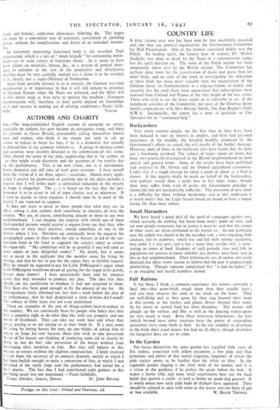AUTHORS AND CHARITY
SIR,—The long-established English custom of sponging on artists, especially on authors, has now become an outrageous ramp, and there are persons in Great Britain, presumably calling themselves honest men and women, who think it no shame not only to ask an author to reduce or forgo his fees, if he iS a dramatist, but actually to defraud him of any payment whatsoever. A group of amateur actors and actresses were recently detected in the commission of this crime. ,They altered the 'name of the play, suppressing that of the author, so tat they might evade discovery and the payment of the royalty due on the performance. This is no new crime, nor is it uncommon. Every dramatist can tell tales of such gross evasions I have myself been the victim of it on three separatz occasions. Almost every appli- cation I receive for permission to perform one of my plays includes a request that I will either make a substantial reduction in the royalty or forgo it altogether. The a is based on the fact that the per- formance is to be given in aid of some charity, war or otherwise. If I were to accede to these requests, I should soon be in need of the charity I am expected to support. It does not seem to .occur to these People that what they are, in effect, asking is that authors shall contribute to charities all over the country. "We are, of course, contributing already to those in our own neighbourhood. I can imagine the surprise with which one of these thick-minded persons would receive a request from me that they, who contribute to their local charities, should contribute to one in the district where I live. Novelists are continually beset by requests for autographed copies of their works for sale at bazaars in aid of the sus- tentation fund or the fund to augment the curate's salary or restore the organ-loft. "My committee will be so grateful if you will send us some copies of your delightful works!" No doubt, but it seems not to occur to the applicant that the novelist earns his living by writing, and that he has to pay for the copies they so lavishly request. Why he should be expected to pay for Little Piffleington's organ when Little Piffleington would not dream of paying for the organ in his parish, heaven alone knows! I have occasionally been told by amateur actors that they intended to produce my play. The idea that they should ask my permission to produce it had not occurred to them. They have also been good enough to fix the amount of my fee. An undergraduate lately informed me, less than a week before the date of its performance, that he had dramatised a story of mine, did I mind? The subject of filthy lucre was not even mentioned.
These are examples of the sort of things authors have to endure in this country. We are continually beset by people who fancy that they have a complete right to do what they like with our property and our means of livelihood. They can take our work how and when they please, paying us or not paying us as they think fit. If a man earns his living by letting houses for rent, no one thinks of asking him to reduce or forgo his rent because those who wish to take possession
of One of houses are thinking of rendering some aid to charity by doing so, nor do they take possession of the house without even mentioning their intention to him. But they will behave in this manner to writers without the slightest compunction. I lately received a letter from the secretary of an amateur dramatic society to which I had been foolish enough to make a concession of fees, in which I was informed of the really large sum the performance had raised for a local charity. The fact that I had contributed eight guineas to this gratifying result was not mentioned. —Yours faithfully,


























 Previous page
Previous page